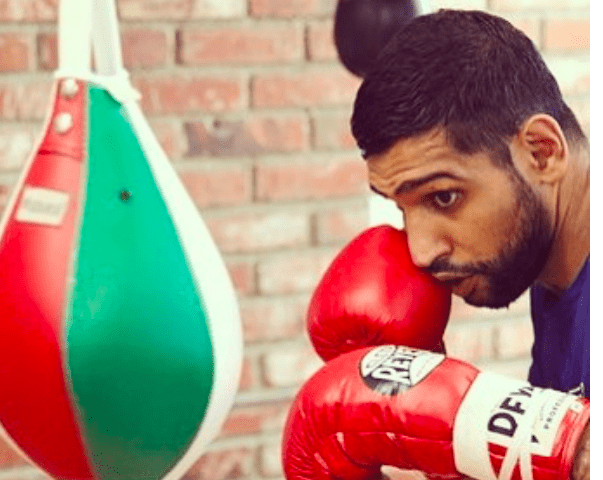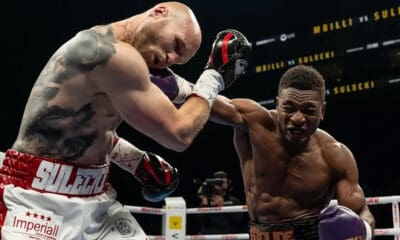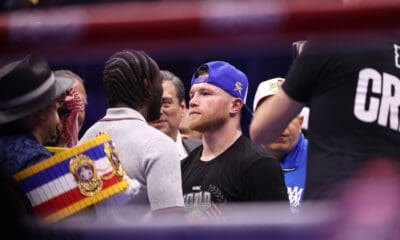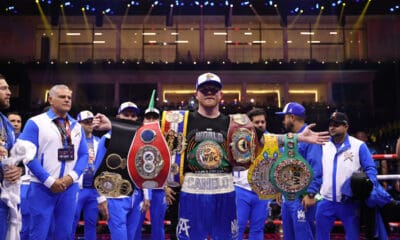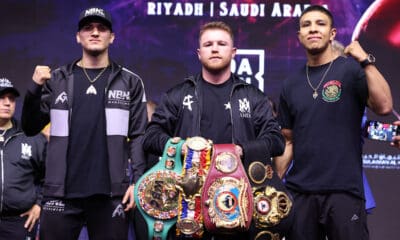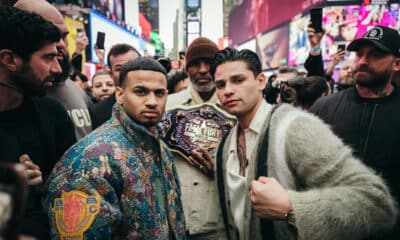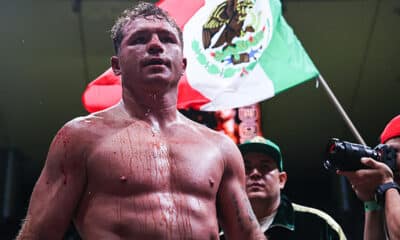Amir Khan is at an unexpected intersection of chasing greatness in athletics, fame, charity. Boxing has been good to Amir. On Saturday, Khan returns to the ring for the second time since a knockout loss to Canelo Alvarez over two years ago.
Sometimes comebacks in boxing create more questions than answers, “Why is he returning to the ring?” Khan has enough money to secure his family for generations. Khan leverages his name to build a reputation as a philanthropist outside of the sport. Going into the tail end of his boxing career, Khan, age 31, wants to spend the next few years fighting the best and continue charity work through the Amir Khan Foundation, which helps the less fortunate, and creates boxing schools in the UK, India, and Pakistan.
We sat with Amir to discuss what he learned from the Canelo fight and understand the challenges of a veteran fighter trying to cement a legacy outside of the sport.
Ray Markarian: What do you remember most about the Canelo fight?
Amir Khan: The Canelo fight? It was a massive fight, and I just remember how big of a fight it was, because he was a Mexican superhero, and has a big name in America. People couldn’t believe that I was going to be fighting him. When I said I’m going to fight Canelo from moving up from 147 pounds, coming up to fighting someone at 160, they were like, “Is this guy crazy?” But not only fighting someone who is a weak boxer, but this guy’s a good boxer, he can hurt you, and he’s got a lot of power, and I remember when I was in the ring with him, I was hitting him, and one time, okay, okay, I was beating him to the punch, I was hitting him. I was really nervous as well, because I knew that I can get hurt here, and I was catching him with some good shots and moving, making him miss a lot, but I could see that nothing was hurting him.
If I was hitting the same guys at my weight division with those shots, I think I would have hurt them a lot, but when I was hitting Canelo, you could see that he was getting a little hurt, but wasn’t really feeling it that bad where he was pushing them back. He was dealing with it. Maybe he was getting hit with combinations thinking, “Okay, I’m going to get him now,” and then just couldn’t catch me, just couldn’t catch me, and then the time he did catch me with a shot that probably would have knocked out anyone, you know what I mean? He came with a really big shot, and that’s boxing for you. You could be winning a fight, you could be looking good, and it could happen in the last round, or the middle of the fight it can happen. If you get caught with a big shot, then it’s lights out.
But looking back at that fight, I’d rather get knocked out with one shot than taking numerous big shots like that, because I think that would do more damage to you. But it was something I wanted to do, I wanted that fight, and I’m glad I done it now, because I know that going up a weight, not going up one weight, but going two or three weight categories isn’t for me, and I need to stick at my own weight division, because otherwise you can get hurt.
RM: Did anyone reach out to you that you didn’t expect to reach out to you after the fight? Any name that pops into your head?
AK: You know what? I had a lot of people like Roy Jones. I had so many fighters reach out. Sylvester Stallone messaged. I mean, I had so many people who messaged on social media saying what a great performance it was by me, and said I showed a lot of heart going into that ring. So a lot of high-profile people messaged on social media and tagged me on it. Also, Conor McGregor was another one who said that, it showed a lot of heart stepping in the ring with Canelo, and he compared my performance to when he fought against, I think it was Diaz, he moved up two weight categories to fight Diaz, and he said, “Sometimes, when you’re fighting guys heavier, it’s hard to win.” He had a lot of respect for me and sent me a nice message.
So, yeah, I got a lot of messages from a lot of high profile people, which made me smile as well, because they know what I was going into at the time. I got a lot of criticism as well, which is normal, but I kind of pushed that over my shoulder and just let that by.
RM: Do you feel like your passion changed at all?
AK: No. I mean, I still love the sport, honestly. I’m 31 now. I always used to say I’m going to retire at 28, 27/28, because my career, it started off really young, but then as I got older, I had a few injuries here and there, which kind of stalled a bit of my career, so that’s why, now at 31, I’m still young, I’m still fresh, I still feel like I’ve got a lot left in me, so why not just have a couple more years? At the moment, I’m going strong, and I love the sport still. The day I wake up and I’ll be like, “Okay, I’ve had enough now, and I’m going to just relax and enjoy everything I’ve achieved from boxing,” then I’ll know when that is, but at the moment, I’m still happy with what’s going on.
RM: Great. So you want to be a role model, you’re obviously chasing greatness, what does chasing greatness mean to you?
AK: Chasing greatness means just working hard in life, and still having that love for the sport, you know what I mean? Still having love for boxing. I mean, it’s boxing that bought me here, so I have to respect boxing as well. At the end of the day, I can’t just go into fights thinking it’s going to be easy. When it comes time for me to train hard, I have to train hard, because nothing comes easy on the plate, you have to work hard for it, and this is one thing I realize in life, if you want to achieve anything, as long as you work hard towards it, at least you know yourself you give it 100%. This is a message I normally give to kids out there. I say to them, “If you want to achieve anything in life and be the best and reach greatness, it’s up to you. As long as you give it 100%, at least you know deep inside yourself that I’ve given it 100% and it happened, or if it didn’t happen, it’s just one of them things.”
But I know for a fact, if you give it 100%, you can achieve anything, and that’s what I did. When I was young, I always dreamt of being great and having good things in life and achieving big things in life, and it was all about just working hard and giving it 100%. Even the days when you’re tired or you have injuries, still pushing through them, and I’m at the stage in my career now where having an injury now is like nothing, because I’ve got through and come through so much injuries in my career, and so many times I’ve come through tough times in my career. If I can get through that now, having little injuries and having little setbacks now is nothing.
RM: How would you handle a setback like the Canelo fight if you were younger?
AK: It’s hard to say, because since I got back from the Olympics, I’ve had all this media attention and attention from the general public a lot, and I was 17 then, it was all new to me, but I still lived a normal life, I still did what I wanted to do. Never let it get to me. So, when I was about 25, 26, when I started winning world titles, I never let it get to me. I just dealt with it and let it go by, because I know tomorrow I can prove them wrong. I can go out and win another world title and it shuts them up. So, I’d rather shut them up with my boxing talent and winning, instead of standing there and arguing with anyone. I could be there arguing with many people, but I just don’t want to do that.
RM: Going back to growing up, you said your family pushed you into boxing. I know your father had a big influence on your life growing up. Can you talk to me about your relationship with your father?
AK: Yeah, my father at the age of eight, I was really hyperactive when I was young, full of energy. It might not seem it now, but I used to be full of energy and I used to always get into trouble. I used to get in trouble in the school. Even going out playing outside, I used to always get into like bother. My dad said to me, “Look, we need to divert your energy into something positive.”
RM: Right.
AK: My dad said, “Let’s take you to the boxing club.”
RM: Ok.
AK: There was one not far from where we lived. A lot of parents probably would have thought, this is probably the worst thing that you could take your child to is a boxing club. If he loves to fight outside and in school, why take him to a boxing club? You’re going to only teach him to fight more. No, it did the opposite to me. Boxing taught me discipline.
RM: Right. Yeah, and just from the outside observations, it looks like, to me, you’re one of the most respectful boxers I have met, and you’re going towards the tail end of your career, I think it’s safe to say.
AK: No, no, 100%, yeah.
RM: How do you think you’re going to be remembered?
AK: It’s hard to say. One thing with boxing is it’s one of them sports where people … There’s only a very few fighters they’ll always remember. I think that’s their charm, that’s the way they are, the personality outside of boxing. I think I’ll be one of them fighters that’ll always be remembered, because of maybe my fighting style, the way I fight, the way I give it 100%, and how hard I train. I travel all around the world, and I do a lot of stuff outside of boxing, helping the less fortunate, helping the poor people. I have my foundation, charity foundation. So when people see my work, they’ll be like, “Oh, that’s that boxer doing all this work.” So boxing is always going to be part of my life. People are always going to remember me, and I think that’s a nice thing as well, because it’s boxing that bought me here, and I never want people to ever forget that. It’s boxing that made me, but then it was up to me to take it further.










